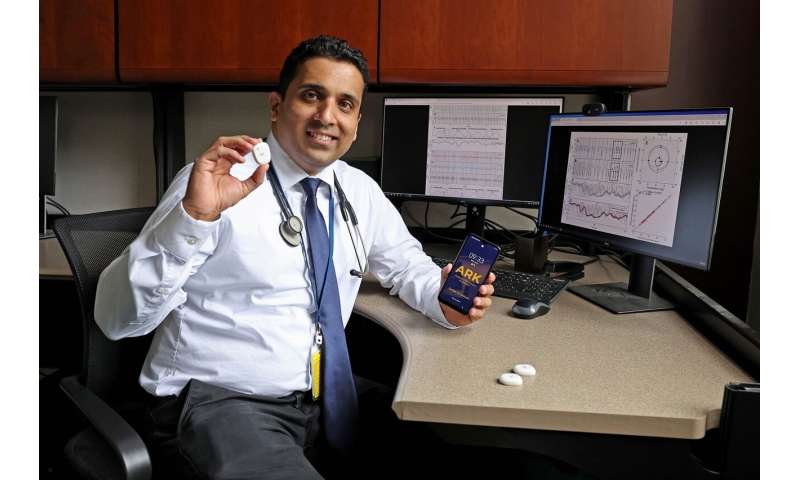Every breath you take: Invention detects breathing problems before it's too late

Dr. Shrirang Gadrey saw the tragedy play out far too many times: A patient's breathing would be stable in the morning, but— without much warning—abruptly collapse by the afternoon, necessitating life support in the intensive care unit. Sadly, many patients did not survive.
In medical terms, these episodes are labelled as "unanticipated respiratory compromise." Gadrey observed seasoned nurses and respiratory therapists who were often able to anticipate the episode by homing in on a patient's labored breathing pattern, but didn't always alert physicians.
"It always comes down to, 'Well, all the other vital signs were normal and I wasn't really sure if the breathing pattern was significant enough,'" Gadrey said. "It struck me that all this would be eliminated if we could measure labored breathing precisely, quantitatively, like we measure blood pressure or temperature."
Gadrey, an internal medicine physician at UVA Health, wanted to find a solution. And with the help of the University of Virginia Licensing & Ventures Group, he and his team have done just that through a technology they invented called ARK, which stands for Analysis of Respiratory Kinematics.
Gadrey believes ARK can do for labored breathing what a sphygmomanometer does for checking a person's blood pressure or a thermometer does for taking someone's temperature.
"When the prognostic importance of labored breathing is indisputable, why would you not want a precise measurement?" Gadrey said. "Why would you leave it to subjective visual estimation at the bedside?"
Gadrey says the main problem for caregivers is they are often unsure of how to respond to labored breathing.
Currently, nurses are required to page a physician anytime a patient's blood pressure drops below 90. When this happens, physicians enact a prompt and decisive protocol until the blood pressure normalizes. But no such triggers or targets exist for labored breathing because there is no quantitative measure for it, Gadrey says.
The ARK device is based on algorithms that analyze motion sensor recordings of breathing. Gadrey created it with collaboration and mentorship from UVA School of Medicine professors Sarah Ratcliffe and J. Randall Moorman; School of Engineering professor Ronald Williams; and UVA computer engineering doctoral student William Ashe (now a data scientist at UVA's Center for Advanced Medical Analytics).
ARK has the potential to measure more than 10 indicators of labored breathing. Right now, it calculates respiratory rate; determines the degree of synchronization between a person's chest, abdomen and neck motions when breathing; categorizes a patient's breathing phenotype—whether they are a "chest breather" or "belly breather"; and quantifies degree of breathing phenotype stability.
A proof-of-concept study showed that having this type of information can predict if patients will remain in a general hospital ward or need to be immediately admitted to an intensive care unit.
The son of a physician, Gadrey grew up in Mumbai, India, where he attended medical school. He did his residency at the MedStar Washington Hospital Center in Washington, D.C., before going into private practice for three years in Oregon.
"I toyed with the idea of doing an engineering degree, but in the end medicine prevailed because it was always my first love," Gadrey said. "This project, in a way, brings me back to that second career that I imagined. It has been a way to satisfy the 'what if?' that I always felt about an engineering career."
It was his vision for ARK that, in 2016, brought Gadrey to UVA. Gadrey quickly connected with the UVA Licensing & Ventures Group, whose moto is, "Where research gets real."
"There was this voice in my head saying, 'Well, you have these ideas. Are you going to passively wait for them to come about or are you going to go do something?'" Gadrey said, who goes by "Shri" (a shortened version of his first name Shrirang).
"The main reason I moved from private practice to UVA was to see if my ideas had any merit."
UVA LVG Executive Director Richard W. Chylla said they most certainly do.
"We feel that Shri is really onto something with ARK," he said. "It's a device that can help such a wide swath of people—and not just here in Charlottesville, but around the world."
In 2020, Gadrey—as UVA researchers and entrepreneurs are encouraged to do—disclosed his invention to LVG.
Gadrey said LVG helped him apply for patents for ARK and helped him understand the commercialization process, including how to think about his technology from a customer standpoint. He also participated in I-Corps, an LVG program funded by the National Science Foundation designed to teach entrepreneurial skills to University researchers in order to prepare them to commercialize their technologies.
"Their role has been immensely valuable," Gadrey said of LVG. "There were blind spots in my knowledge that I wasn't aware of that they helped me rectify."
Gadrey is currently seeking funding for ARK and hopes to have a more commercially viable prototype in the coming months.
"Even though I created ARK for the gap I saw in my own work, what's really exciting about it is it's a broadly applicable technology with more uses beyond just my field," Gadrey said.
"In remote parts of the world, a lot of kids under the age of 5 lose their lives to pneumonia because community health workers can't count the child's respiratory rate even if they are at the bedside. If the health workers have ARK, more kids could get antibiotics sooner. So ARK can not only benefit a cutting-edge, First World hospital like UVA Health, but also in a simple primary care center in the most remote part of the world, which is where I've practiced in the past. That broad applicability is what really excites me about ARK."
Provided by University of Virginia